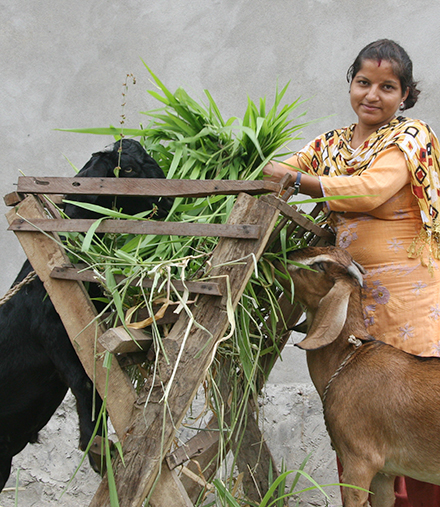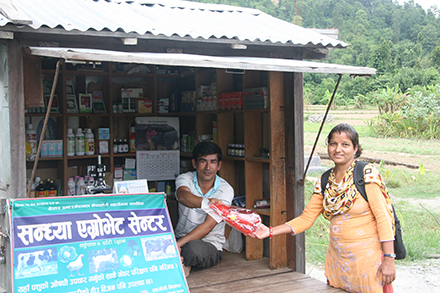During the month of October, we will be highlighting Heifer's work to empower women in a series we're calling the Power of WE. The series began Oct. 4, and many of our posts will focus on women who are becoming entrepreneurs in their own right. Today we continue the series by featuring Radha Amatya from Nepal.

Radha Amatya, 28, is setting the bar high for women entrepreneurs in Nepal. From choosing a husband to choosing a career, she has always made her own decisions.
It is a long-held tradition in Radha’s family that daughters marry at 16. So, when Radha turned 16, she felt trapped by tradition and, seeing very few options, she decided to elope with her now husband, Indra Mohan Amatya. “Because he belonged to a different caste, my parents would have never given their permission for our marriage and I would be forced to marry a stranger of my parents’ choice,” she said. Soon after they married, Radha gave birth to their first child. As a young wife and mother, it was a struggle for Radha to complete high school.
After few years of marriage, Radha’s husband went to work in Saudi Arabia with hopes of earning more money to better provide for his growing family. Indra left his family with 130,000 Nepalese Rupees, or about $1,320, in debt.
Radha moved to Lamahi, a small town 72 miles from home, with her 6-year-old daughter and 2-year-old son. In a new town full of strangers, she was able to continue her studies after convincing her landlady to babysit her children. After completing her education, she started working as a primary level math teacher.
In July 2012, Radha left her teaching job to work as a Community Agro-Vet Entrepreneur (CAVE) through Heifer Nepal’s Strengthening Smallholders in Livestock Value Chain Analysis project. This project provides capable candidates like Radha with 35 days of CAVE training and seven days of agriculture training. This extensive training builds participants’ capacity to be service providers to farmers involved in livestock and agriculture activities. CAVE students also receive 30,000 Nepalese Rupees, or about $304; a microscope; an ear tagging machine; a cool box to preserve medication; and a Burdizzo castration device to set up their own agro-vet shop.

Radha’s agro-vet shop has been open for about a year. In that time, she has made a total of 160,454 Nepalese Rupees, or about $1,629, worth of transactions. Each month, she earns an average of 6,000 Nepalese Rupees, or about $60. Since receiving Enterprise Development training from Heifer Nepal, Radha is able to maintain excellent transaction records. The training has helped her organize her business and keep track of the type and amount of medicine she sells each month.
It only took a few months of working as a CAVE to recognize the great earning potential. So, Radha convinced her husband to return home to help her run the shop. In December 2012, Indra quit his job in Saudi Arabia and headed home. The couple has opened a new agro-vet shop in Dang, which Indra runs with help from his wife. He will receive his CAVE training in the coming days.
During her early days as a CAVE, Radha had a hard time convincing the farmers to listen to her or consult her when they needed help. “The farmers would not let me castrate their livestock,” she said. “They thought this job was only for men and that it was shameful for a woman to do such a job.”
For large animals, the farmers preferred male assistance, because they thought women were not physically strong enough to control the animals. “It is not physical power that is needed to handle these large animals, but rather proper technique required to get the job done,” Radha said. Persistence has been the key to Radha’s success, as these once-reluctant farmers now consult her when they have problems with their livestock.
Radha attends monthly women’s group meetings in her area, which includes three wards in Bangeshal, located in Nepal’s Pyuthan district. During meetings, she gives advice to the farmers about improved animal management and farming and offers counseling and medicine if their livestock is ill. She coordinates with the community facilitator to plan her field visits.
“I carry a bag of medicines while going to the field and the farmers already know when I will visit their village,” Radha said. “I have planned field visits and I go through organized groups, so it is easier for me to give the message and treat the livestock.” In addition to the three wards that have been assigned to her, Radha also provides service to two more wards in the same district and one ward each in Dang and Argakhachi districts. Radha is always available for free consultations. She gives her number out everywhere she goes and encourages farmers to call her without hesitation. This excellent customer service has helped her build a strong customer base.
Radha left her teaching job to work as a CAVE because she wanted a bigger challenge. She wanted to grow and explore more. This job takes her to new places and she gets to work with new people. Each day brings a new challenge. She has built a strong network with the farmers in her work area, as well as local government officials who work in the agriculture and livestock sector.
Radha maintains regular contact with District Livestock Service (DLS) officials and the District Agriculture Development office. She is an active member of the Agro-vet Workers Network at the district level and regularly attends its interaction program. “The program helps me to build my network, discuss our problems, obstacles and cases, and learn from the senior veterinary doctors,” Radha said. In the coming days, she hopes to win the Excellent Village Animal Health Worker Award, which is given by the DLS office.
Furthermore, she plans to take the Junior Technician Assistant (JTA) skill test. Becoming a JTA requires completion of a 12-months course and three months of on-the-job training, but because she has already received CAVE training and has field experience, she is already eligible to take the test. As a certified JTA, Radha will have the opportunity for employment with Heifer projects or government offices.
Radha feels responsible for the productivity of livestock and agriculture in her village. “I feel very proud when I solve complex cases, but I feel equally sad when I cannot save an animal’s life,” she said. “I wish the farmers would call me as soon as possible when they have a problem.”
Radha plays a significant role in achieving Heifer Nepal’s Strengthening Smallholders in Livestock Value Chain Analysis project’s objective, which is to increase livestock productivity by 50 percent to achieve sustained family income, nutrition and food security. With the objective of becoming a role model for other farmers, Radha has raised two goats and has maintained a kitchen garden in the back of her house. The goats are given a proper mix of leguminous and non-leguminous grass and are very healthy. The family has enough fresh vegetables throughout the year from the garden, so they no longer need to purchase them from the market.
Radha is a phenomenal example of an entrepreneur. From bringing her husband back to the country and creating a family business to helping farmers improve their productivity, she is bringing big change in her community.
Empower a woman entrepreneur in Nepal today.
Story and Photos by Alina Karki, Planning, Monitoring and Evaluation Temp, Heifer Nepal